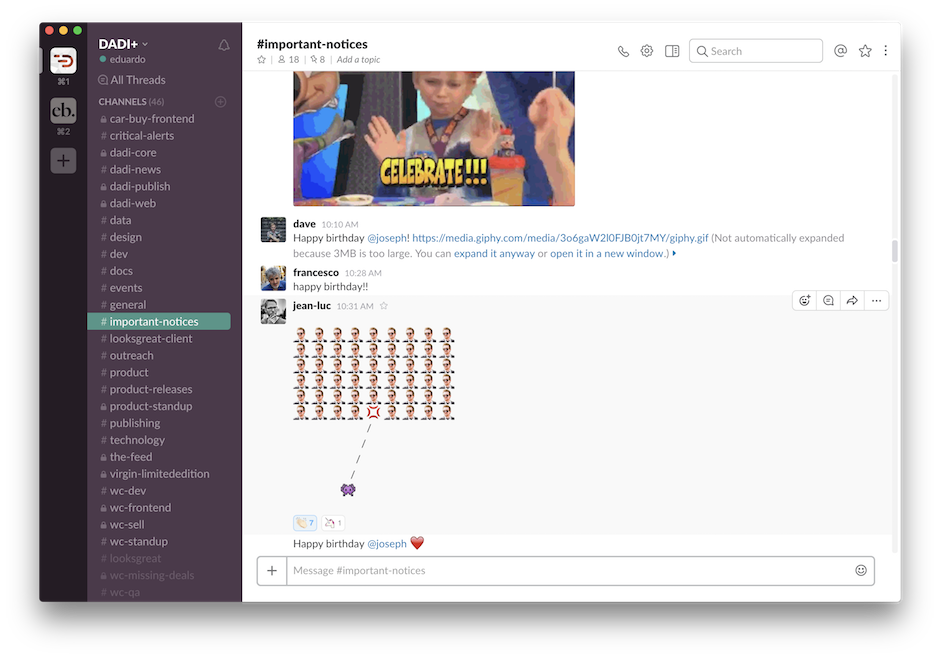It's been just over a year since I joined DADI and, like everyone else in the company, started working fully remotely. There are still many people that are curious and intrigued by this work style and there are certainly many myths around it; after a year of experiencing it myself, I thought I'd share some of my own views on the matter.
¶ The norm and the outlaw
First and foremost, it's important to distinguish between remote-friendly and remote-first companies. Any company can suddenly become remote-friendly by allowing some of their employees to work outside the office. For a business, this might make sense because a particular role is too difficult (or too expensive) to hire for in a particular country, or it might simply be to attract the best people in the industry regardless of geographical location.
(...) you can’t just bring in remote workers and expect everything to still work the same without adjustments.
But there's a lot more to it than just telling people it's okay to work from home. In an organisation where processes traditionally depend on face-to-face interactions and synchronous communication, you can't just bring in remote workers and expect everything to still work the same without adjustments. «The remote guy? Erm, he can just dial in...» is really not how it works.
Fortunately for me, DADI is an example of a remote-first company. Remote work and asynchronous communication is a fundamental part of the company's identity, and there's not even a physical office to begin with. Every process and tool used in the company has been chosen with remote workers in mind, so that philosophy has become second nature to everyone involved: directors, engineers, project managers and even clients. You don't feel like an outlaw that's sitting at home whilst everyone else is eating cake and telling jokes at the office.

¶ Working from home
Working remotely means that you can (in theory) work from anywhere. Some people go to co-working spaces, while others like to be in busy environments like a café. Buying food and drink from cafés in London every day is not really compatible with my pocket, so that's a big no for me. I like working from home.
I once worked at a company with a traditional office space where, for some reason, the air conditioning was always set to a really cold temperature. Everyone seemed to be cool with that (ha!), but I was really uncomfortable. It may seem like a ridiculous and insignificant thing to even mention, but I had to spend the best part of my day, every single day, in an environment where I felt uncomfortable. I absolutely hated that.
By working from home, I'm able to control almost every aspect of the environment that surrounds me: it's never too cold or too hot, I wear whatever I want, sit in my favourite chair, look at the walls with the paintings I chose and eat my own food. I love that.
Working from home is not perfect and there are some pitfalls to watch out for, though.
¶ More freedom, less boundaries
When I tell someone that I work from home, they immediately picture me lying on the sofa watching TV all day (the cheeky ones will even say that out loud). This is because people are used to the traditional "9 to 5" work model, where they effectively sell 8 hours of their day to a company.
Who's never felt really unproductive on a particular day but had to painfully wait for 6pm to clock off?
I see that philosophy as outdated and I'm much more in favour of a ROWE (Results Only Work Environment) mindset, where success is measured by an individual's output and not by the number of hours spent in the workplace. Who's never felt really unproductive on a particular day but had to painfully wait for 6pm to clock off?
However, this extra freedom comes with fainter boundaries. It's true that once I started working from home I immediately gained a couple of hours every day that I would otherwise spend commuting, but it's also true that most days I end up spending that time working. There isn't an established time at which you physically leave work and go home, disconnecting from the job until the next morning. I end up working more than I used to before.
Establishing a healthy routine becomes entirely your responsibility and different people achieve it in different ways. I tend to use my wife's routine to shape mine: start working when she leaves in the morning, stop working when she comes home in the evening.
¶ Early risers and night owls
Part of the beauty of asynchronous/distributed teams is that everyone is able to work whenever they feel most productive, without the constraints of normal office hours. Some people like to start working early, others work better at night. Throw different timezones into the mix and you suddenly have a company with people working 24/7, with some people's work days never overlapping others.
In an office, you know you can just knock at someone's door or go to their desk whenever you need anything: you're there, they're there, everyone is working, otherwise they wouldn't be there. In a distributed team, things are a bit more difficult and it's actually part of your job to ensure your peers can enjoy the flexibility they need.
Try to understand the routines of the people you work the closest with and avoid contacting them outside their working hours unless you absolutely need to. Avoid sending messages to everyone (e.g. @channel in Slack) unless really necessary. If you keep getting messages after you've stopped working, you feel pressured to respond and next thing you know you're working a "double shift". Be strict with the routine you establish for yourself and respect everyone else's.
Pro tip: If you work with people from multiple timezones, a world clock is a must have. I use it all the time to figure out if Jim is awake or not.
¶ Human interaction
I think it's crucial to be surrounded by people that challenge, question and teach you. It's difficult to become a better professional by staying in isolation, which is a risk you take by working from home. Make sure you establish relationships with your colleagues that go beyond the daily work subjects.
In the same way that in a physical office you'd swivel your chair to tell a joke or vent about something with a colleague, you should be able to do a quick Slack/Skype/Hangouts call with a colleague for whatever reason. It's important to know that you're still surrounded by humans and part of a team, not a loner behind a screen.
Mingling with local development communities in your city, by attending conferences and meetups, is a great way to surround yourself with other professionals and establish new connections. If you don't live in an area with an established community, perhaps you can kickstart it yourself.
¶ Conclusion
Sometimes I do miss the feeling of leaving an office in the evening and completely shutting down that part of my brain for the rest of the day, no matter what happened. I miss having people around to talk to discuss a new idea with and end up starting a new project together out of nothing.
But I also enjoy the freedom that I have, and the chance to shape my work around my life and not the other way around is something I learned to cherish very much. ∎
